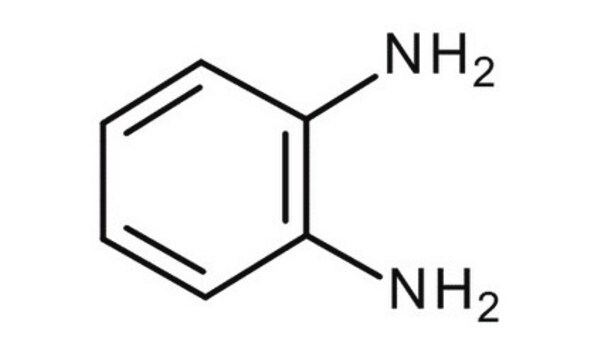1.07243
1,2-Phenylenediamine
GR for analysis
Synonym(s):
1,2-Phenylenediamine, 1,2-Diaminobenzene
About This Item
Recommended Products
vapor pressure
0.013 hPa ( 20 °C)
Quality Level
form
solid
autoignition temp.
540 °C
expl. lim.
1.5 % (v/v)
pH
7-8 (20 °C, 50 g/L in H2O)
bp
257 °C/1013 hPa
mp
99-103 °C
transition temp
flash point 110 °C
solubility
54 g/L
density
1.14 g/cm3 at 20 °C
bulk density
530 kg/m3
storage temp.
2-30°C
InChI
1S/C6H8N2/c7-5-3-1-2-4-6(5)8/h1-4H,7-8H2
InChI key
GEYOCULIXLDCMW-UHFFFAOYSA-N
Application
- Synthesis of imines from the coupling reaction of alcohols and amines catalyzed by phosphine-free cobalt(II) complexes.: This study explores the use of 1,2-phenylenediamine in catalytic systems, demonstrating its efficacy in synthesizing imines, which are pivotal in various synthetic applications (Mahato et al., 2024).
- Copper(II) Driven Fluorescence switch-on Detection of Ovalbumin and GSH Using a Pyridoxal 5′-phosphate Derived Tetradentate Schiff Base and its Applications.: Research demonstrates the application of 1,2-phenylenediamine-based ligands in creating sensitive fluorescent probes for bioanalytical applications (Dhanshri et al., 2024).
Analysis Note
Identity (IR): passes test
Melting range (lower value): ≥ 99 °C
Melting range (upper value): ≤ 103 °C
Sulfated ash: ≤ 0.25 %
Water (K. F.): ≤ 1.0 %
Signal Word
Danger
Hazard Statements
Precautionary Statements
Hazard Classifications
Acute Tox. 3 Oral - Acute Tox. 4 Dermal - Acute Tox. 4 Inhalation - Aquatic Acute 1 - Aquatic Chronic 1 - Carc. 2 - Eye Irrit. 2 - Muta. 2 - Skin Sens. 1
Storage Class Code
6.1C - Combustible, acute toxic Cat.3 / toxic compounds or compounds which causing chronic effects
WGK
WGK 3
Flash Point(F)
276.8 °F - closed cup
Flash Point(C)
136 °C - closed cup
Certificates of Analysis (COA)
Search for Certificates of Analysis (COA) by entering the products Lot/Batch Number. Lot and Batch Numbers can be found on a product’s label following the words ‘Lot’ or ‘Batch’.
Already Own This Product?
Find documentation for the products that you have recently purchased in the Document Library.
Customers Also Viewed
Our team of scientists has experience in all areas of research including Life Science, Material Science, Chemical Synthesis, Chromatography, Analytical and many others.
Contact Technical Service










